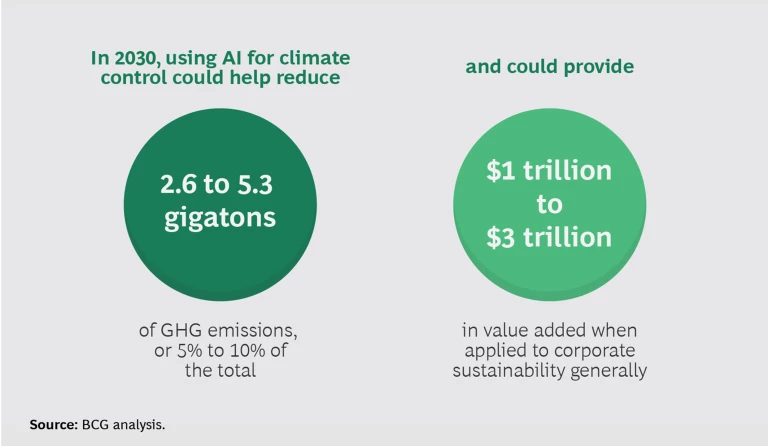The pressure on businesses to respond to the threat of global warming is growing. Consumers, regulators, and investors alike are increasingly scrutinizing the climate impact of companies in every industry. In his January 2020 letter to CEOs, for example, Larry Fink, chairman and CEO of BlackRock, the world’s largest asset manager, put companies on notice that investors—among other stakeholders—now expect full disclosure of companies’ performance on a range of environmental, social, and governance factors.
But it’s one thing for companies to pay lip service to the need to reduce their greenhouse gas (GHG) emissions. Taking concrete measures to make a difference, especially in today’s pandemic-driven economic climate, is another matter entirely. The difficulty and expense of measuring the full extent of their carbon emissions, and then reducing or offsetting them, has forced many companies to delay the effort.
In this context, artificial intelligence (AI) can be a game changer. Its ability to deliver deep insights into multiple aspects of a company’s carbon footprint and quick cost-cutting wins offers a promising route to accelerating sustainable transformation and reducing expenses in a time of need. And because their size gives them access to huge data sets—a key success factor for deploying AI—large companies are in an especially strong position to benefit from its power.
The Promise of AI
The threat of climate change is growing, and time is running out. Global GHG emissions currently total about 53 gigatons of carbon dioxide equivalent (CO2e), according to the Carbon Disclosure Project. If we are to meet the goal of limiting the increase in average global temperatures to 1.5°C, as specified in the 2016 Paris Agreement, we must reduce those emissions by 50% by the end of this decade, according to the Science-Based Targets Initiative. In our experience with clients, using AI can achieve overall emissions reductions of 5% to 10%—the equivalent of 2.6 to 5.3 gigatons of CO2e if AI were applied to all emissions.
Using AI can reduce GHG emissions by between 2.6 and 5.3 gigatons of CO2e.
Meanwhile, BCG studies show that the potential overall impact of applying AI to corporate sustainability amounts to $1.3 trillion to $2.6 trillion in value generated through additional revenues and cost savings by 2030.
This added-value figure for companies does not take into account changes in the price of carbon offsets. That number, currently set at around $30 in the EU Emissions Trading System, could double by 2030. BCG expects to spend $80 per ton by 2030 on high-quality, permanent GHG removal as part of its Net Zero pledge . At this increased price level, the value of reducing GHG emissions through the use of AI would represent an additional savings of $208 billion to $424 billion for all companies globally. If carbon offset prices rise even higher over the coming years, AI opportunities will surely represent even greater savings.
How It Works
The great strength of AI lies in its ability to learn by experience, collecting massive amounts of data from its environment, intuiting connections that humans fail to notice, and recommending appropriate actions on the basis of its conclusions. Companies looking to reduce their carbon footprint should turn the AI spotlight on all three components of the effort:
- Monitoring Emissions. Companies can use AI-powered data engineering to automatically track emissions throughout their carbon footprint. They can arrange to collect data from operations, from activities such as corporate travel and IT equipment, and from every part of the value chain, including materials and components suppliers, transporters, and even downstream users of their products. AI can exploit data from new sources such as satellites. And by layering intelligence onto the data, AI can generate approximations of missing data and estimate the level of certainty of the results.
- Predicting Emissions. Predictive AI can forecast future emissions across a company’s carbon footprint, in relation to current reduction efforts, new carbon reduction methodologies, and future demand. As a result, they can set, adjust, and achieve reduction targets more accurately.
- Reducing Emissions. By providing detailed insight into every aspect of the value chain, prescriptive AI and optimization can improve efficiency in production, transportation, and elsewhere, thereby reducing carbon emissions and cutting costs.
In short, AI can help large companies reduce their environmental impact while also alleviating the financial pressure they face as they emerge from the COVID-19 crisis.
Industries that can benefit from this approach include industrial goods (see “A Steelmaker Cuts Emissions and Costs with AI”), transportation, pharmaceutical, consumer packaged goods, energy and utilities (see “AI-Powered Sustainability at a Large Oil and Gas Company”), and others.
A Steelmaker Cuts Emissions and Costs with AI
Since implementing these controls, the company has pursued a subset of initiatives that have already achieved carbon emissions decreases of 3%, representing approximately 230,000 tons of CO2 per year, along with cost reductions of $40 million—a significant benefit for a company with $8 billion in revenue.
As impressive as these gains are, the company had already made significant progress in optimizing its operations before adopting these changes. We calculate that AI would have a much greater impact for the industry as a whole, helping steel companies reduce their emissions by 5% to 10% and their costs by 1%. If every steel company achieved such reductions, the industry would emit 200 million to 400 million fewer tons of CO2 each year.
AI-Powered Sustainability at a Large Oil and Gas Company
To rectify the problem, we redesigned the control system to implement a machine-learning-based predict-and-act approach and created an integrated operating center to unify the views on all plant equipment. We also encouraged the company to adopt a change management strategy to foster the adoption of the new tools.
The new end-to-end system uses a number of machine-learning models, including tools that predict maintenance problems and CO2 emissions for each production unit. This capability enables plant engineers to predict the energy consumption and emissions of all of their units for the next three to five hours—and to isolate, analyze, and fix any unit responsible for excess emissions.
As a result, the company lowered its carbon emissions by 1% to 1.5%, representing 3,500 to 5,500 tons of GHGs per year, and reduced its costs by approximately $5 million to $10 million. The system also achieved 87% accuracy in predicting equipment failures and had an 80% success rate in forecasting emissions anomalies.
By scaling up this AI-powered tool and using machine learning to replicate it across machines and plants, oil and gas companies can gain a comprehensive, real-time view across all of their production operations.
Reaping the Benefits
To gain these benefits, company leaders must make it a top priority to target areas with high carbon emissions and significant costs—especially those with a potential payback period of less than 24 months. Even the practice of AI uses large amounts of energy, and companies should subject its emissions, too, to analysis. (See “Mitigating AI’s Carbon Footprint.”)
Companies should subject their AI-related emissions to analysis, too.
Mitigating AI’s Carbon Footprint
Since then, the power of state-of-the-art technology has become much greater: OpenAI’s latest version of its AI model, called GPT-3, is hundreds of times more powerful than last year’s model and produces the same amount of GHG emissions as a car being driven more than 700,000 kilometers.
The lesson: exponential increases in AI’s algorithmic complexity and the growing adoption of AI solutions throughout the economy and society require AI practitioners to find ways to mitigate the technology’s environmental footprint.
That’s the goal of CodeCarbon, a combined effort of BCG Gamma; Mila, a world-leading AI research institute in Montreal founded by Turing Award recipient Yoshua Bengio; Pennsylvania’s Haverford College; and Comet.ml, a collaboration platform for machine learning.
CodeCarbon automatically captures the information needed to estimate CO2 emissions due to computing, enabling users to track, record, and visualize the emissions released in the course of every experiment and across multiple projects.
It also provides visibility into the levers that developers can pull to reduce their footprint. This in turn allows them to design more frugal and more efficient algorithms, position their servers in locations where producing power generates the lowest level of emissions, and choose the most efficient hardware for their systems. By pulling these levers, data scientists can reduce the emissions released in training algorithms by up to ten times. And because CodeCarbon is an open-source program, users can contribute to its further development.
We recommend adopting a three-pronged approach:
- Aim high. Use AI to improve the visibility of carbon emissions across the value chain. Then determine where to apply the technology to reduce the footprint, starting with the largest sources of carbon emissions and costs.
- Start small. In designing your AI approach, use prototypes and pilots, to create a strong basis for further learning and development. Use the minimum viable product (MVP) concept to design a workable AI system, and then iterate on it, integrating feedback to make it better.
- Scale fast. Scale up the MVP solution and transform the organization around it to increase its impact. Invest in building core capabilities and enablers in parallel with scaling up the MVP. These should focus on developing enabling tech platforms at scale, defining new ways of working, and implementing the organization and governance models needed to align AI and overall strategy.
Act Now
AI has already demonstrated its near-term value in helping companies reduce their GHG emissions and cut costs. By generating a positive ROI, often within a year, it should quickly become a financial benefit to companies, rather than yet another cost. We believe that AI can be especially valuable now, as companies recover from the COVID-19 crisis, in lowering costs and beginning the transition to a low-carbon future.
In the longer term, as the price of carbon emissions rises and as advances enable AI to tackle more complex climate issues, the technology will become increasingly important in mitigating the effects of global warming.
Aim high, start small, scale fast.
Now is the time for leading companies to begin reaping the benefits of AI. Aim high, start small, and scale fast.
The authors thank Cyrille Viossat, Anouk Placet, Mathilde Duverger, and Hamid Maher for their contributions to this publication.












